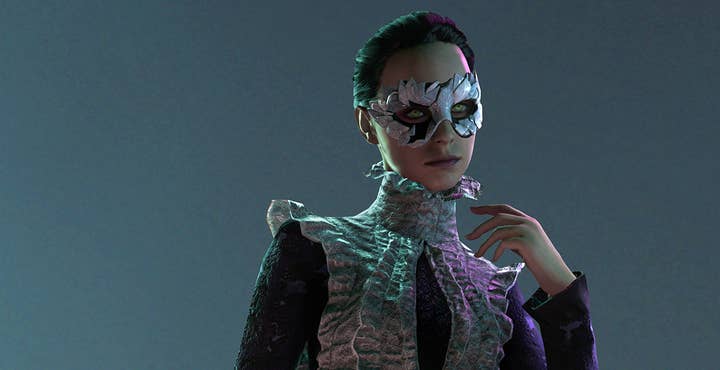Improving the depiction of mental illness in Vampire: The Masquerade
Bloodlines 2 writer Brian Mitsoda says developer Hardsuit Labs is moving away from the "'wacky' kind of mental illness"
Mental health institutions in games are environments of hostility filled with gibbering attackers. Indigo Prophecy's asylum level was presented as if it were a horror setting. World of Warcraft's villains are often motivated solely by 'madness,' or 'insanity.'
Then there's this notorious line of dialogue with spoken by a Malkavian player character to a stop sign in Vampire: The Masquerade - Bloodlines: "You've made a powerful enemy today, sign!"
Bloodlines, released 15 years ago, made mental illness the butt of many jokes when playing as a character from the deranged Malkavian clan -- the dialogue for which was infamously written in a very short span of time.
"I think more time could have been spent developing [these characters] at the time, but their presentation in the first game is due more to the strain of having to get them out quickly," writer Brian Mitsoda tells us. "I think people still enjoy the unique experience of them, but I don't think they're a great examination of mental illness and shouldn't be held up as one."

Mitsoda has spent the better part of two decades working on RPGs and learning that they can take an enormous amount of time to make. Some never even reach the light of day.
TORN, cancelled in 2001, was his first lesson. He moved from Black Isle Studios to Troika a year later to write Vampire: The Masquerade - Bloodlines, which released in 2004.
After Troika shuttered, he spent nearly 15 years in a creatively nomadic existence working on just a few RPGs. His heart and soul were poured into projects like Obsidian's cancelled New Jersey. Likewise, his contributions to Alpha Protocol were largely left at the side of the road by the time the game came out. The long arc of development on some of these games has led to the occasional feeling of being creatively trapped.
In 2020, four and a half years of effort will pay off in the release of the sequel to the game that first gained him notoriety 15 years ago. All of these years haven't just taught him about how long it takes to breathe life into a game like this, though. It's also about finding an outlet and learning to punch up instead of down. With Bloodlines 2 on the horizon, he now wants to be more considerate in portraying mental illness.
"I'm still generally pissed off about the political climate in the US, but I'm much better at channeling that aggression into my work than generally being stressed out about it," he says. "I'm still looking for ways to use the medium to tell a different story than can't be done in any other format."
This comes as a reiteration of his desire to have Bloodlines 2 take a more firm political stance. One way in which he seeks to do this is by not kicking an already beleaguered group of people while they're down with regard to mental illness.
There are 13 clans in Vampire: The Masquerade, the tabletop RPG on which Bloodlines is based. Since the first edition of the tabletop game, the Malkavian clan has been a pillar. They are vampires gifted with oracle-like insight, but are also unilaterally mentally ill. Those two characteristics intertwine in what is known within the game as "dementation."
They are often referred to as insane, lunatics, or madmen. This mental illness is designated as a weakness called a 'clan curse.'
"I'm pretty tired of any weird, over-the-top, or violent characters being dismissed as 'Well, they're crazy.' That's just lazy"
The mental illnesses they face run the gamut, but can bear close resemblances to things like schizophrenia, dissociative identity disorder, bipolar disorder, and so on. They experience frequent audio and visual hallucinations. In Bloodlines, this often manifests as persistent whispers which follow the player character.
With mental illness being a core identifying trait of the Malkavians, some role-players take that as a license to behave erratically for the purposes of slapstick hijinks. That has come to be labeled as playing a 'fish malk,' based on the idea of a player like this using the clan's "weakness" to suddenly slap somebody in the face with a fish for no reason, for example.
Malkavian player characters in the first game have that option, which often makes them the butt of a joke stemming from their own mental illnesses. Fifteen years on, those depictions no longer interest Mitsoda.
"I think, in general, I'm pretty tired of any weird, over-the-top, or violent characters being dismissed as 'Well, they're crazy.' That's just lazy. I still see this in movies, games, and TV all the time," he says.
The core trait of the Malkavian clan is still dementation, but Mitsoda has expressed interest in doing a more nuanced exploration of it. "We're getting away from the 'wacky' kind of mental illness. There's a part of the Malkavian presentation this time that really is a bit of a darker implication of not being able to tell what's real and what isn't."
Dead State is a zombie survival RPG released in December of 2014 and another of Mitsoda's previous projects. Its portrayal of Jenifer Strong, a character diagnosed with schizophrenia, may provide some early evidence of his sincere desire to grow and treat mental health issues with a more delicate touch.

The National Institute of Mental Health describes schizophrenia as chronic and severe, and as being characterized by symptoms like hallucinations, delusions, dysfunctional modes of thinking, flat affect, a numbed sense of pleasure, difficulty focusing, executive dysfunction, and more. It can be quite debilitating, but many individuals diagnosed with clinical schizophrenia go on to manage their illness through a combination of antipsychotic medications and therapies.
If your perception of schizophrenia is sculpted solely by popular media, however, you would likely think that it is an engine that drives the types of homicidal chainsaw-wielding prowlers in slasher movies. The National Alliance on Mental Illness says that, "Despite media focus on the exceptions, individuals receiving treatment for schizophrenia are no more prone to violence than the general public."
"The Malkavians aren't an accurate representation of mental illness, but are influenced by it"
Jenifer Strong is not ensconced in the common tropes of an unstable murderer. Dead State portrays her as a warm people-pleaser. She first greets you in-game with a pot of coffee and some friendly advice. She occasionally checks in on you to make sure you're doing OK.
After enough time passes in the shelter, she appears distressed and a skill check in medicine can reveal that her antipsychotic medication is stranded back at her home. Retrieving her medication alleviates her distress. If she suffers long enough without it, her condition devolves.
She never becomes violent, though. In fact, the systems of the game reinforce that she is not a violent threat by giving her stats that would make her unsuitable for combat. She will ultimately suffer a breakdown and flee the shelter without her medication.
In writing the character, Mitsoda did his research and he will treat the Malkavians with the same care. "Pretty much for anything I write, I don't go in blind."
That said, he emphasizes to us that the Malkavians of Bloodlines 2 will not be one-to-one representations of mental illness or those who live with one or several. The playable characters in the game are exclusively vampires which are, by their nature, inherently dangerous.
"I want people to have an understanding that the Malkavians aren't an accurate representation of mental illness, but are influenced by it," says Mitsoda. "But at the same time, being a stand-in for people with similar problems, I don't want them to be purely comic relief.
"As I said before, I'm pretty tired of mental illness being used as a crutch in writing -- the twist or punchline being the character is crazy. It's pretty obvious when a writer has just written themselves into a corner if they use the 'They're crazy' excuse to justify sudden shifts in motives or character traits."
He concludes: "If the Malk experience gives players a fraction of perspective of someone dealing with something close to this, that will be a win for me."
